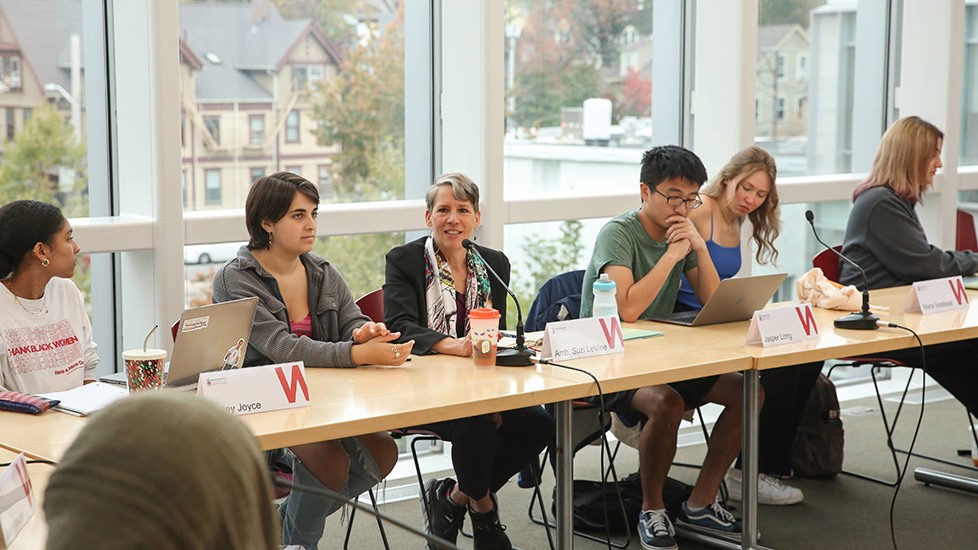The Power of the States
Suzi LeVine
Meeting dates are Mondays, 10/3, 10/17, 10/31, 11/14, 11/28. Each session will meet from 11am - 12:50pm.
Registration closes on September 25
Access to abortion, school curricula and allowable books, redistricting, marriage equality, voting rights, equity, access for trans-gender individuals to sports in school, religious freedom, marijuana legalization – these are just a few of the hot topics that are being decided and/or debated in the States.
Especially as exemplified over the past year by high-profile state legislation, Supreme Court decisions and/or pending Supreme Court cases, the role and growing power of the States is loud and clear and is being recognized and leveraged more than ever to impact people’s daily lives. But those decisions and pieces of legislation didn’t just magically appear and weren’t “overnight successes”.
As a Brown alumna and leader in the public, private and non-profit sectors and as the former head of large government agencies at both the state and federal level (a more detailed relevant bio is at the bottom), I look forward to guiding you through this seminar and to the robust and dynamic conversations it will inspire! You will get to meet incredible leaders from across the nation working on some of these areas as well as state legislators sharing their accomplishments from the magnificent to the mundane.
The arc across these sessions will start with an introduction to state government and how the states work. It will then feature several case studies and personal examples of state efforts which we will then unpack, reverse engineer and pattern match. Finally, we’ll look at the difference between impact at the State vs. the Federal government and will synthesize the full sweep of what we’ve heard and considered over the five sessions.
Through this seminar, I believe you will see that States are where the action is and that you can play a key role in that action if you choose!
Humanitarian Considerations in Immigration Systems: Status Quo and Imagined Future
Leon Rodriguez
Meeting dates are Fridays 9/23, 10/7, 10/21, 11/4, 11/18. Each session will meet from 11am - 12:30pm.
Registration closes on September 18
A frequently heard refrain in our national political discourse is that our immigration system is “broken.” While some argue that our system is overly generous, others believe that it is often cruel and restrictive in a manner contrary to our national interests and humanitarian values. Advocates, faith leaders, business executives, and even police chiefs often question whether our immigration system even begins to reflect our national reality and our values. Not surprisingly, our domestic debates are echoed in many countries throughout the world.
While employment-based or family-based immigration also spark debate, the greatest controversies surround immigration programs focused on those in needed, such as currently undocumented residents of the U.S., asylum seekers, applicants for refugee status, victims of war and natural disaster, and/or those seeking to escape poverty and political chaos. Recent estimates by humanitarian organizations place the number of displaced persons throughout the world at eighty million, while the refugee admission policies of those countries willing to accept refugees sit at the tiniest fractions of that number. In the meantime, global climate change promises to bring global displacement to unprecedented and unimaginable levels.
The need for fresh and imaginative solutions to address these challenges could not be more urgent. In the group’s final sessions, we will work together to imagine a viable future immigration system that prioritizes universal principles of humanitarianism and equity and the plan an effective advocacy strategy to turn some of those ideas into policy. As the foundation to this exercise, the study group will explore the current state of U.S. and foreign immigration bureaucracies, focusing in particular on the political drivers of U.S. immigration policy, including the unseen forces that preserve what many across the political spectrum view as a dysfunctional status quo.
To ensure that the study groups hears a variety of perspectives, I plan to have two prominent guest speakers who I will announce as we draw closer to the start of our study sessions. Seeking to have informed and energetic discussions, several days prior to each study group session I provide brief readings, including crucial immigration policy documents from the Bush, Obama, Trump and Biden administrations, as well as factual scenarios for discussion.
National Security, Innovation, and the Congress
Arun Seraphin
Meeting dates are Fridays, 9/23, 10/14, 10/28, 11/11, 12/2. Each session will meet from 1-2:30pm.
Registration closes on September 18
The Study Group will explore the role that Congress and policy making can play in creating an environment to support innovation in our national security science and technology enterprise. The Group will discuss the opportunities and challenges of implementing innovative technologies and practices into the complex defense establishment and understand how policymakers can work to create a legal framework, regulations, culture, and financial resources that can support or inhibit innovation. The Group will explore the processes by which Congress crafts legislation, provides funding, and performs oversight activities over the Pentagon. The Group will also provide insights and information on the complementary roles of the legislative branch, executive branch, and the private sector in shaping the policy and innovation environment. Each meeting will consist of presentations by Dr. Seraphin on national security innovation policy issues, along with occasional guest lectures from experts from Washington, DC, and focused discussions related to policy problems and potential solutions to those problems. Students will be expected to read short read-ahead materials for each class, and actively participate in group discussions on class topics.
